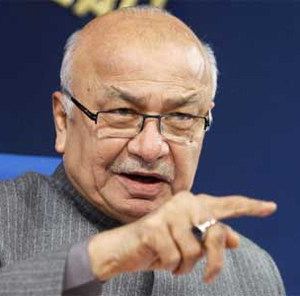NEW DELHI, Mar 26: Union Home Minister Sushilkumar Shinde today cited the 153-year-old IPC to defend his proposal for lowering the consent age for sex to 16 years, days after the anti-rape Bill passed by Parliament retained the age at 18.
Shinde, who was speaking at a conference on Police Reforms in the country, termed the criticism of his move for lowering the age as “ignorance of law” by some people.
“The consent age of 16 years was incorporated in IPC(Indian Penal Code) in 1860. No one had looked into it (then) but when my ordinance came for correcting this…Whole Parliament was against it.
But I brought it to the notice there (that) this law (of 16 years age) was in existence but we have not realised that it was in existence.
“Can we say ignorance of law is not permissible that this country permitted (sic)?,” Shinde said.
However, the Minister, while making this assertion, did not mention about Child Marriage Act, which came into force in 2007, and Child Trafficking Act under which the definition of child has been fixed below 18 years.
The Parliamentarians, during the discussion on this crucial issue, wanted a parity between the IPC and other laws that have been enacted later.
Terming as ‘eye opener’ the ghastly Delhi rape incident of December 16, Shinde assured government’s active efforts to check crime against women.
“That (rape incident) has opened our eyes. Everyday there are rapes. It (the incident) happened in Delhi. All citizens came forward. Everybody right from the press, judiciary and government. It has opened our eyes… Today we have taken cognisance and a law has been passed (to check) disrobing of women,” he said at conference whose theme was ‘Safety and Security: Need for police reforms’ organised by Assocham here.
To a question on existence of fear of insecurity among women, Shinde said the fear of insecurity in women will go.
“Yes, there is a fear at the moment. But that will go. We should not forget a large number of girls were going to BPOs and there was no fear. If an incident (December 16) has happened, we have to correct ourselves. Ours is a civilised society,” he added.
Shinde said a rigid law has also been passed to punish a police officer by giving a minimum punishment of two years’ imprisonment if he does not act on complaints of atrocities against women belonging to Scheduled Castes and Scheduled Tribes.
He said policing needs to be reformed keeping in view the present day scenario. “The policing system needs to be upgraded effectively to deal with crime and criminals and to safeguard the interest of one and all,” he said.
Shinde said many state governments and Union Territories were also working on Model Police Act to bring in reforms and professionalism in policing system.
“The Modern Police Act emphasised professional role of police in a democratic society, its response to the need of the people and its accountability to the rule of law. The Model Act expects police to be impartial and gives protection to the weaker sections including minorities.
“The Model Act was circulated to all states. So far 15 states have enacted the new Police Act or amended existing police Acts. Other states lack behind in completing the task,” he said, stressing the need for reform in the policing system.
He said special focus was needed to check organised crimes and criminal acts against women and elderly especially in metropolitan cities.
“The central government remains fully committed to support the upgradation and modernisation of state police forces…I also need support of state governments, state police forces and society at large to ensure a secure environment around us,” the Home Minister added. (PTI)
Trending Now
E-Paper


